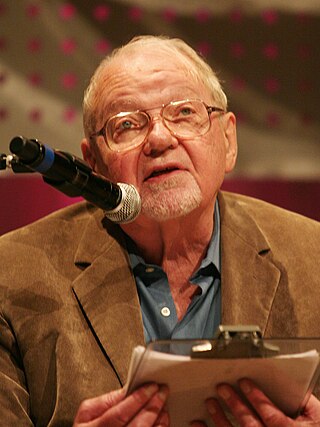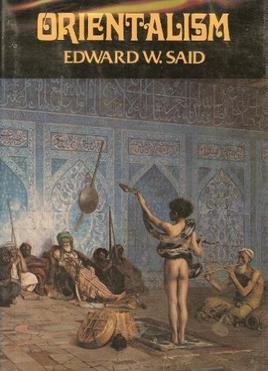The following outline is provided as an overview of and topical guide to critical theory:
Post-structuralism is a philosophical movement that questions the objectivity or stability of the various interpretive structures that are posited by structuralism and considers them to be constituted by broader systems of power. Although post-structuralists all present different critiques of structuralism, common themes among them include the rejection of the self-sufficiency of structuralism, as well as an interrogation of the binary oppositions that constitute its structures. Accordingly, post-structuralism discards the idea of interpreting media within pre-established, socially constructed structures.

Literary theory is the systematic study of the nature of literature and of the methods for literary analysis. Since the 19th century, literary scholarship includes literary theory and considerations of intellectual history, moral philosophy, social philosophy, and interdisciplinary themes relevant to how people interpret meaning. In the humanities in modern academia, the latter style of literary scholarship is an offshoot of post-structuralism. Consequently, the word theory became an umbrella term for scholarly approaches to reading texts, some of which are informed by strands of semiotics, cultural studies, philosophy of language, and continental philosophy, often witnessed within Western canon along with some postmodernist theory.

Gayatri Chakravorty Spivak is an Indian scholar, literary theorist, and feminist critic. She is a University Professor at Columbia University and a founding member of the establishment's Institute for Comparative Literature and Society.

Fredric Ruff Jameson was an American literary critic, philosopher and Marxist political theorist. He was best known for his analysis of contemporary cultural trends, particularly his analysis of postmodernity and capitalism. Jameson's best-known books include Postmodernism, or, The Cultural Logic of Late Capitalism (1991) and The Political Unconscious (1981).
The Subaltern Studies Group (SSG) or Subaltern Studies Collective is a group of South Asian scholars interested in postcolonial and post-imperial societies. The term Subaltern Studies is sometimes also applied more broadly to others who share many of their views and they are often considered to be "exemplary of postcolonial studies" and as one of the most influential movements in the field. Their anti-essentialist approach is one of history from below, focused more on what happens among the masses at the base levels of society than among the elite.
Social criticism is a form of academic or journalistic criticism focusing on social issues in contemporary society, in respect to perceived injustices and power relations in general.
Strategic essentialism, a major concept in postcolonial theory, was introduced in the 1980s by the Indian literary critic and theorist Gayatri Chakravorty Spivak. It refers to a political tactic in which minority groups, or ethnic groups mobilize on the basis of shared identity attributes to represent themselves.
Robert J. C. Young FBA is a British postcolonial theorist, cultural critic, and historian.

In postcolonial studies and in critical theory, subalterns are the colonial populations who are socially, politically, and geographically excluded from the hierarchy of power of an imperial colony and from the metropolitan homeland of an empire. Antonio Gramsci coined the term subaltern to identify the cultural hegemony that excludes and displaces specific people and social groups from the socio-economic institutions of society, in order to deny their agency and voices in colonial politics. The terms subaltern and subaltern studies entered the vocabulary of post-colonial studies through the works of the Subaltern Studies Group of historians who explored the political-actor role of the common people who constitute the mass population, rather than re-explore the political-actor roles of the social and economic elites in the history of India.

Orientalism is a 1978 book by Edward Said, in which he establishes the term "Orientalism" as a critical concept to describe the Western world's commonly contemptuous depiction and portrayal of the Eastern world—that is, the Orient. Societies and peoples of the Orient are those who inhabit regions throughout Asia and North Africa. Said argues that Orientalism, in the sense of the Western scholarship about the Eastern world, is inextricably tied to the imperialist societies that produced it, which makes much Orientalist work inherently political and servile to power.
Postcolonialism is the critical academic study of the cultural, political and economic consequences of colonialism and imperialism, focusing on the impact of human control and exploitation of colonized people and their lands. The field started to emerge in the 1960s, as scholars from previously colonized countries began publishing on the lingering effects of colonialism, developing a critical theory analysis of the history, culture, literature, and discourse of imperial power.

Postcolonial international relations is a branch of scholarship that approaches the study of international relations (IR) using the critical lens of postcolonialism. This critique of IR theory suggests that mainstream IR scholarship does not adequately address the impacts of colonialism and imperialism on current day world politics. Despite using the language of post-, scholars of postcolonial IR argue that the legacies of colonialism are ongoing, and that critiquing international relations with this lens allows scholars to contextualize global events. By bridging postcolonialism and international relations, scholars point to the process of globalization as a crucial point in both fields, due to the increases in global interactions and integration. Postcolonial IR focuses on the re-narrativization of global politics to create a balanced transnational understanding of colonial histories, and attempts to tie non-Western sources of thought into political praxis.
This is a list of articles in continental philosophy.

Ilan Kapoor is a professor of Critical Development Studies at the Faculty of Environmental and Urban Change at York University in Toronto, Ontario, Canada. He is an influential postcolonial scholar, considered the first to bring both psychoanalysis and postcolonial analysis to the field of Development Studies. He is the author of seven books and numerous articles on postcolonial politics, psychoanalysis, participatory development, and celebrity humanitarianism.
Ritu Birla is an historian of modern South Asia. She is an associate Professor of History and is formerly the Richard Charles Lee Director of the Asian Institute and former Director of the Centre for South Asian Studies at the Munk School of Global Affairs & Public Policy at the University of Toronto.
Jenny Sharpe is a professor of English and Comparative Literature at UCLA. Her research focuses on issues of postcolonial studies, Caribbean literature, theories of allegory, the novel, rethinking models of memory and the archive, and the effect of the Middle Passage. In 2020, she began serving as the Chair of Graduate Studies in UCLA's English Department.
Post-Marxism is a perspective in critical social theory which radically reinterprets Marxism, countering its association with economism, historical determinism, anti-humanism, and class reductionism, whilst remaining committed to the construction of socialism. Most notably, Post-Marxists are anti-essentialist, rejecting the primacy of class struggle, and instead focus on building radical democracy. Post-Marxism can be considered a synthesis of post-structuralist frameworks and neo-Marxist analysis, in response to the decline of the New Left after the protests of 1968. In a broader sense, post-Marxism can refer to Marxists or Marxian-adjacent theories which break with the old worker's movements and socialist states entirely, in a similar sense to Post-leftism, and accept that the era of mass revolution premised on the Fordist worker is potentially over.

Vivek Aslam Chibber is an American academic, social theorist, editor, and professor of sociology at New York University, who has published widely on development, social theory, and politics. Chibber is the author of three books, The Class Matrix: Social Theory after the Cultural Turn, Postcolonial Theory and the Specter of Capital and Locked in Place: State-Building and Late Industrialization in India.








